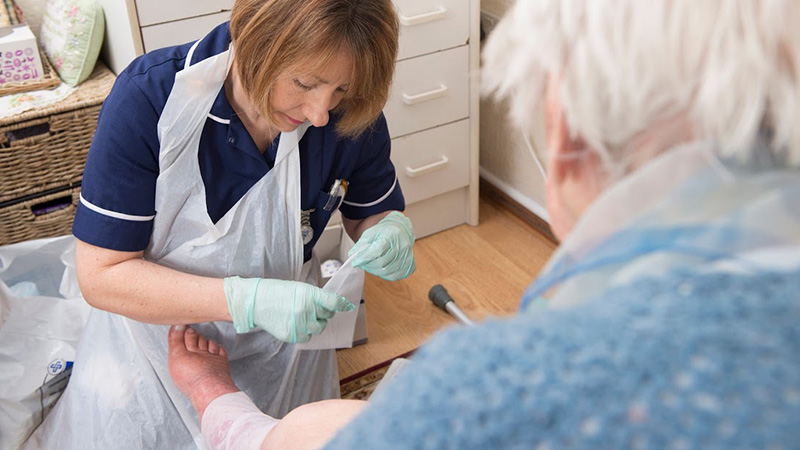Community Nursing Specialist Practice (District Nursing)
PGDip
This course is subject to validation
Start dates: September 2024 / September 2025
Full time: 52 weeks
Part time: 104 weeks
Location: Headington, Headington (Marston Road site)
Department(s): Oxford School of Nursing and Midwifery
Overview
Our PG Dip in Community Nursing Specialist Practitioner (District Nurse) (CNSPQ (DN) programme comprises core modules of study that facilitate the development and progression of experienced registered nurses within the context of the community setting. The programme will explore fundamental community nursing practice in relation to the role of the contemporary CNSPQ(DN) to support the development of a resilient and competent practitioner and leader. Learning outcomes for the programme have been mapped to the 7
platforms of proficiency from (NMC 2022). This programme incorporates the independent prescribing module.
On successful completion of the programme students are eligible to apply to the NMC to have their NMC record annotated for:
Community Nursing Specialist Practitioner (District Nurse)
Independent Prescriber (V300)

Why Oxford Brookes University?
-
Blended learning
Students will attend a combination of in person seminars at the Headington/ Marston campuses and online seminars.
-
Protected Learning Time
All students will have protected learning time within their clinical area throughout their
programme -
Experienced Tutors
Academic staff have extensive experience of NHS and general management at both senior and director level.
-
Strong Research Profile
Our research staff collaborate with researchers from across Oxford Brookes University and from the Institute of Health Sciences at the University of Oxford, amongst others.
-
Great Career Prospects
The programme has been designed to prepare students for employment and career progression in a Community Nursing Specialist Practitioner role.
-
Accreditation(s)
This course is undergoing revalidation with the NMC for September 2024, there will be a change in the module content, subject to NMC approval. Once approved the webpage will be updated.
Course details
Study modules
Please note: As our courses are reviewed regularly as part of our quality assurance framework, the modules you can choose from may vary from those shown here. The structure of the course may also mean some modules are not available to you.
Research
We have a strong research profile. Our experienced researchers work in the following areas:
- cancer care
- children and families
- drugs and alcohol
- physical rehabilitation and enablement
- interprofessional education and collaborative practice.
Our researchers have won external research and consultancy contracts including grants, fellowships and studentships for NHS staff.
Our research staff collaborate with researchers from across Oxford Brookes University and from the Institute of Health Sciences at the University of Oxford, amongst others.
Academic staff have extensive experience of NHS and general management at both senior and director level.
They also have a significant record of research and publications on the topics of management and leadership.

Careers
It is anticipated that students who complete this programme of study will be well-prepared to function in a Community Nursing Specialist Practitioner (District Nurse) role and to achieve career progression. The programme has been designed to prepare students for employment and career development e.g. the focus on leadership throughout the programme. Previous District Nurse students have gained employment as District Nurse Team Leaders, Clinical Development Leads and within education. Several former District Nurse students have
achieved the Queen's Nurse title.
Entry requirements
This course is not available to students classed as International for fees purposes.
Specific entry requirements
You must:
- Have achieved an undergraduate degree or completion of a recent level 6 module.
- Be registered on Part One (Adult/ RN1/ RNA) of the NMC register as an adult nurse
- Have one year of experience working as an RN.
- Be employed in clinical / healthcare practice, in the UK, in a role with consistent patient contact that facilitates development of knowledge and clinical skills to meet the programme learning outcomes.
- secured NHS Trust sponsorship via the Values Based Recruitment Process in place between the university and the NHS Trust or healthcare organisation.
- Or as a self-funding candidate, have achieved a place on the programme via the Values Based Recruitment Process in place between the University and the Sponsoring Trust.
For each of the above, the necessary arrangements and governance structures must be
in place to support practice learning, including: provision of practice assessor and
supervisor, employer support and protected learning time.
Please also see the University's general entry requirements.
Screening
All applicants will be screened for fitness to practise and a Disclosure and Barring Service (DBS) check will be made.
English language requirements
A requirement of the application is that you are UK registered nurse with the Nursing and Midwifery Council and a working UK visa that would permit your employment in the NHS as a Nurse.
Please also see the University's standard English language requirements.
Pathways courses for EU students
We offer a range of courses to help you meet the entry requirements for your postgraduate course and also familiarise you with university life in the UK.
Take a Pre-Master's course to develop your subject knowledge, study skills and academic language level in preparation for your master's course.
If you need to improve your English language, we offer pre-sessional English language courses to help you meet the English language requirements of your chosen master’s course.
Credit transfer
Terms and Conditions of Enrolment
When you accept our offer, you agree to the Terms and Conditions of Enrolment. You should therefore read those conditions before accepting the offer.
How to apply
Application process
Oxford Brookes University works in partnership with a number of NHS Trusts including: Oxford Health Foundation NHS Trust, South Warwickshire NHS Trust and Berkshire NHS Trust. Please ensure that you have been offered a place in an NHS Trust before applying to Oxford Brookes University.
Tuition fees
Questions about fees?
Contact Student Finance on:
Tuition fees
Fees quoted are for the first year only. If you are studying a course that lasts longer than one year, your fees will increase each year.
The following factors will be taken into account by the University when it is setting the annual fees: inflationary measures such as the retail price indices, projected increases in University costs, changes in the level of funding received from Government sources, admissions statistics and access considerations including the availability of student support.
How and when to pay
Tuition fee instalments for the semester are due by the Monday of week 1 of each semester. Students are not liable for full fees for that semester if they leave before week 4. If the leaving date is after week 4, full fees for the semester are payable.
- For information on payment methods please see our Make a Payment page.
- For information about refunds please visit our Refund policy page
Financial support and scholarships
Funding is secured via application to an NHS Trust for a student post for the 52 week course (Student School Nurse or Student Health Visitor); this will involve an application to NHS jobs for the student vacancy followed by a joint interview with a community NHS Trust and the University. A values based recruitment strategy is used for all aspects of selection. please ensure that you are familiar with NHS Constitution values for professionals.
You should not apply for this course at Oxford Brookes until funding has been secured with an NHS Trust and you have a conditional offer in writing from an NHS Trust to commence the course.
For more information please contact the Programme Administrator.
Additional costs
Please be aware that some courses will involve some additional costs that are not covered by your fees. Specific additional costs for this course are detailed below.
Travel expenses will be incurred (only travel within the practice placement will be reimbursed).
Core texts are available in the university library, there are no essential purchases of books required.
Online submission of assessments eliminate printing costs for all modules.
Programme changes:
On rare occasions we may need to make changes to our course programmes after they have been
published on the website. For more information, please visit our
changes to programmes page.


